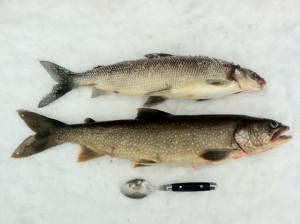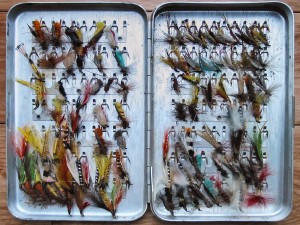West of Rangeley (A Review)
Salvatore D’Amico might be an unusual name for a fishing guide in Maine’s Rangeley Lakes region, but that’s the least of Sal’s worries. In fact, nothing about him smacks of native or local.
It is what it is though, and Sal makes no apologies to anyone. Yes, he has a past, and it had nothing to do with western Maine. Yes, it was on the American “left coast,” and for a short time it included being side-swiped by fame as an upstart novelist. It also included a wife who died of a drug overdose. Like a stonefly in spring, Sal shed the outer shuck of those years and began listening to his inner fishermen, which ultimately led him to a cabin in western Maine and a new life as a fishing guide.
Bailey, Sal’s girlfriend who owns the local bookstore, accepts the package as is, game leg and all. With his sport for the day and his Black Lab, Buck, the middle-aged Sal shuffles off with his clicking knee and sore hip to trout pools off the radar of fair weather fishermen. Sal and Bailey convene, romantically, after hours at his beloved base of guiding operations on Otter Pond.
Robert J. Romano, Jr.’s West of Rangeley, the second novel in his Western Maine Series follows his well-received, North of Easie. In West, a drama is about to unfold, but before it does, Romano takes a long time to give you the landscape. You’ll look over Sal’s shoulder at his fly-tying vise as he wraps and finishes the head and hackle of a favorite trout fly. You’ll watch the surface of Otter Pond dimpling with native squaretail. Bailey drops by after work and you eavesdrop to learn how these two, rebounding from train wreck marriages, found each other. Their once-tumultuous pasts are quieter now.
You have the feeling this tranquility can’t last, and you’re right. There are architectural drawings already at the Town Hall awaiting rubber-stamp approval from the Planning Board. A local entrepreneur, wealthy from the tourist trade, has found partners to help back a project that will transform Otter Pond into a puddle flanked by faux-rustic condos owned by “summer people” wearing golf shirts and visors. Sal opens a letter to find a purchase offer for twice the value of his place, the last holdout property.
If that weren’t enough to ruin any day’s good fishing, Sal, while guiding one day, discovers a clandestine, midnight gold-dredging operation which threatens to destroy the integrity and stream bed of one of the best local native brook trout fisheries. Just to thicken this suspensful soup, a dazed, wounded vet and local hero, recently returned from Afghanistan, goes missing, and what’s more, somebody’s firing automatic weapons at cardboard human targets just outside of town. Sal’s friend, the district game warden, who also happens to be conducting a long distance relationship with Sal’s daughter gets involved, and so does a newcomer to town––a former Special Forces-turned free spirit who loves eastern philosophy as much as he loves Long Trail Ale.
Romano weaves a tangled web, and you’re about as convinced as his main character is that this has to end poorly. Really poorly. Surely the bad guys, who pass for good guys since they’re homegrown natives and he’s from away, will prevail. And what about the prospector/fishery destroyers, and the missing hero, and the M16’s being fired in the middle of the night?
The thing is, Buck’s Black Lab nose sniffs out something illegal going on across Otter Pond, and this is when it pays to have Buddhist, beer-drinking, Green Beret friends. All Sal wanted was a quiet life with Bailey and Buck, his tying vise, and as many more trips to the region’s storied trout waters as his aging legs would allow. Was that too much to ask?
West of Rangeley uses a fictitious Maine town as the setting for Romano’s novel, but you end up thinking the author might’ve chosen any number of real ones with no loss of credibility. He populates his tale with true-to-life characters of the kind you run across constantly in Maine––the sheriff whose belly protrudes so far over his belt, you think all his buttons must be reinforced, salt-of-the-earth, hard-working folks, interlopers who’ve found a place to be weird, left alone, and they like it that way.
No stranger to the region could’ve written West of Rangeley, and Romano isn’t. If Billy Joel coined and characterized a “New York State of Mind,” in music, Romano has depicted a Maine State of Mind with precision in West of Rangeley. Apart from the intrigue of his new novel which is fun to follow, West of Rangeley is a mood-enhancing read which can, with discipline, be taken in small doses (short chapters) so as to make it last longer.
West of Rangeley by Robert J. Romano, Jr.; 224 pages, $22.00 Birch Brook Press (2012)



